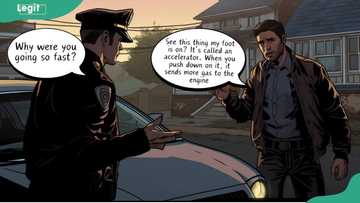An idiom is a phrase that, when taken as a whole, has a meaning you can’t deduce from the meaning of the individual words. These phrases will leave you thinking what the meaning could be if it is your first time to hear them. Incorporating these phrases when communicating can add colour and humour to your speech. Funny idioms can also make your speeches interesting.
Funny idioms have meanings that differ from the words that make them. Photo: Roberto Machado Noa (modified by author)
Source: Getty Images
TABLE OF CONTENTS
It is crucial to use idioms when speaking because they improve your communication skills by adding depth and richness to your language. Some idioms are funny and will make you laugh when you try to picture what the individual words mean. Using them when communicating will give your language a creative feel.
Funny idioms with meanings
Idioms are challenging to understand because the meaning differs entirely from the words that make them up. Below are funny idioms for kids and adults and their origins and meanings.

Read also
50 best Henry Ford’s quotes on learning, success and money
Funny idioms for adults
Some of these funny idioms can only be understood by adults, as kids tend to interpret them literally. Below are hilarious idioms for adults.
1. Bite the bullet
It is a funny way of saying to do something unpleasant or painful because it is necessary even though you want to avoid it. The idiom originates from the practice of having a patient clench a bullet in their teeth to deal with the pain of going through surgery without anaesthesia.
2. To have a screw loose
To have a screw loose means to be mentally unstable or eccentric. It is a hilarious idiom because all that comes to your head is having a screw loosened. However, it does not involve any tool; it is just a funny way to say someone’s behaviour is odd.
3. Eat a horse
It is a humorous way to say that one is extremely hungry. The origin of this phrase is unknown, but it has been used since the 19th century.

Read also
40+ creative sleepover games for kids, teens and adults
4. Get someone’s goat
It implies annoying or upsetting someone. This expression comes from a horse racing tradition. A goat was placed in a stall the night before the race to calm down an easily upset horse.
5. To get in somebody’s hair Getting in somebody’s hair means annoying someone. Photo: Deagreez
Getting in somebody’s hair means annoying someone. Photo: Deagreez
Source: Getty Images
Getting in somebody’s hair means annoying someone, especially by being present at all times that they cannot do anything. The phrase likens the annoyance to the time-consuming and painful process of untangling hair.
6. The last straw
It is the final annoyance or problem that leads to a breaking point. This phrase comes from the old expression, “the straw that broke the camel’s back.” According to Ginger Software, the expression was first used around 1755.
7. To hit the hay
The expression means to go to bed or retire for the evening. It originated from sleeping on hay-stuffed mattresses, prevalent in the 19th century.
8. Don’t give up your day job
Read also
“Down bad” meaning: here is your new slang term of the week
Don’t give your day job a hilarious way to tell someone that you do not think that they are not good at something. When you use this expression in a statement, you tell the person that they need to keep doing what they are great at instead of taking a stab at something new.
9. To jump ship
To leave (a cause or party) often to take up another. The idiom was first used in the Navy when a sailor jumped out of a ship without getting permission from the person in charge and left without the intention of returning.
10. Kick the bucket
This phrase is hilarious because it is an almost joking way to say ‘die’. There are plenty of origins behind this idiom, but the most known one is that it came from a wooden frame called a bucket. The frame was used to hang animals by their feet for slaughter in the 16th century.

Read also
150+ funny shower thoughts to ponder while you shampoo your hair
11. Keep your shirt on
Keeping your shirt implies staying calm, being patient, or not giving away your temper or excitement. Before a man starts to fight, he wants to take his shirt off as a sign of anger.
According to Book Browse, the phrase was first used in 1854 in The Spirit of the Times by George W. Harris, who wrote, ‘I say, you durned ash cats, just keep yer shirts on, will ye?’
12. Have or get your ducks in a row Having your ducks in a row means being well-organised. Photo: trulyinspired
Having your ducks in a row means being well-organised. Photo: trulyinspired
Source: Getty Images
Having your ducks in a row is a funny way to say to be well prepared or well organised for something. What comes to mind is ducks in a row, which one can find funny after finally learning the meaning.
This idiom originated from the meticulous alignment of ducks before a race to symbolise preparation.
13. When pigs fly
Pigs cannot fly because they do not have wings. The imagination of seeing a pig flying is hilarious and also impossible. This phrase is used when you want to say something will never happen or is impossible. The term originated from either Germany or Scotland.

Read also
125+ funny things to say to break silence in any situation
14. Out of the blue
It refers to something happening unexpectedly. The original form of this expression was a bolt out of the blue. The phrase was used to refer to the unlikelihood of a lightning bolt coming from a clear blue sky.
15. The elephant in the room
The elephant in the room is a phrase used to represent an obvious problem or difficult situation that people do not talk about.
The idiom comes from Ivan Krylov’s 1814 fable, The Inquisitive Man, which describes a man who goes to a museum and notices all the tiny things except the elephant in the room.
16. To read between the lines
It means interpreting hidden or unstated meanings in a situation. The phrase originates from cryptography, where invisible ink messages were concealed between visible text lines.
17. Cold turkey
It means to stop using an addictive substance completely. Originating in the early 1900s, it initially referred to abrupt events and later, in 1921, described the abrupt treatment of drug addiction.

Read also
150+ really morbid jokes for lovers of edgy dark humour
18. Frog in your throat Having a frog in your throat means having difficulty speaking. Photo: Wild Horizons
Having a frog in your throat means having difficulty speaking. Photo: Wild Horizons
Source: Getty Images
Having a frog in your throat implies having difficulty speaking because your throat feels dry, and you want to cough.
The idiom, first used in the 19th century, comes from the sound a person makes when they have a sore throat, which is reminiscent of a frog.
19. To let the cat out of the bag
The phrase means accidentally revealing a secret. Many stories explain this idiom’s origin, but the most popular is livestock fraud at markets where animals like pigs and goats were sold in sacks. A seller would go home and discover he has a cat inside the bag, not a pig.
20. To pull someone’s leg
It implies deceiving someone playfully or persuading them to believe something untrue. It originated in 19th-century London, where robbers worked in pairs. One robber tripped the victim while the other stole their valuables. They didn’t pull legs but caused the victim to stumble.

Read also
What are some of the worst inventions ever made? A list of 15 most useless
Funny idioms for kids
Funny idioms will tickle your kids’ imaginations and spark curiosity about words and meanings. Here are a few examples to get you started:
1. In the same boat Being in the same boat means to be in the same unpleasant situation. Photo: Stephanie Rabemiafara (modified by author)
Being in the same boat means to be in the same unpleasant situation. Photo: Stephanie Rabemiafara (modified by author)
Source: Getty Images
To be in the same boat implies to be in the same unpleasant situation as other people. The ancient Greeks first used the phrase to refer to the dangers and risks they faced by travelling together in small boats on unpredictable seas.
2. To be on the same page
This phrase is used when you want to let a person know that you are thinking similarly, have the same knowledge, or understand a situation. Teachers use this idiom most of the time in class to ensure that all students have a similar understanding of a topic. It is attributed to choral singing when all singers must be on the same page.
3. To be all ears
It means to be ready and eager to listen to what someone is saying. The idiom first appeared in print in the 18th century. We use our ears to listen, and most communication is done verbally, so the phrase means to focus all your attention on what is being said.

Read also
20+ drinking games for two for a fun way to spend an evening
4. To be the teacher’s pet
If someone calls a child the teacher’s pet, the teacher likes the student and is always treated better than other students. The phrase was first used in 1914, but its origin is unclear.
5. Running around like a headless chicken
It means panicking. The phrase originated in England when chickens were killed by chopping off their heads. The headless chickens still ran around in panic even after the head was cut off.
6. Hold your horses
The phrase means to slow down, be patient, or wait before taking action. The expression dates back to ancient times, with early references appearing in Homer’s Iliad and later in 19th-century America, where it evolved into a metaphor for exercising patience or waiting.
7. Piece of cake If something is a piece of cake, it means that it is easy to achieve. Photo: Tara Moore (modified by author)
If something is a piece of cake, it means that it is easy to achieve. Photo: Tara Moore (modified by author)
Source: Getty Images
It implies something is easy to achieve or do. The phrase originated from slavery in the American southern states in the 1870s. Black slaves performed cakewalks, and the winner received a cake.

Read also
Is it bad for a girl to take the first step about a relationship?
8. Raining cats and dogs
When someone says it is “raining cats and dogs,” it is a rainy day, and it is raining unusually or unbelievably complexly.
It comes from the Greek expression cata doxa, contrary to experience or belief. The phrase can also be a distortion of the word catadupe. In old English, catadupe meant a cataract or waterfall.
9. Crocodile tears
It means to pretend to be sad about something. According to History Extra, this phrase originated from crocodiles shedding tears when attacking their victims as a trap or to lure in their prey.
10. Cat, got your tongue
This phrase refers to someone being unusually quiet or at a loss for words, often used to ask why they aren’t speaking. Its origin dates back to the Middle Ages when liars were cut out of their tongues and fed to the king’s cats.
11. To be in hot water
Read also
130+ powerful seduction quotes to reignite the passion in your life
Being in hot water implies getting into a problematic situation where you are in danger of punishment. The term originated in the early 1500s and can be traced back to being in uncomfortably hot water.
12. Put a sock in it
When someone tells you to put a sock in it, they ask you to be quiet or stop making so much noise. This expression originated in the trenches of the First World War when soldiers used it to mean “shut up.”
13. Pick your brain
If someone says he wants to pick your brain, they mean they want to ask for advice or information because you know more about a subject than they do.
The phrase dates back to the 1800s when doctors took pieces of a patient’s brain to study it. By studying the brain, they gained insights into the workings of the mind.
14. Spill the beans
Read also
50+ quotes about lockdown life everyone in the world can relate to
 Spilling the beans means to reveal something prematurely. Photo: Badri Susanto
Spilling the beans means to reveal something prematurely. Photo: Badri Susanto
Source: Getty Images
It means to disclose a secret or reveal something prematurely. This phrase originated from an ancient Greek voting method where beans were used to cast votes. When beans were spilt prematurely, that could inadvertently reveal the election’s outcome.
Short and funny idioms for adults
These idioms help lighten the mood and bring a smile to even the dullest moments. They are also easy to remember and employ in a conversation.
1. Eager beaver
If someone calls you an eager beaver, they mean that you are a person who is highly zealous about performing duties and volunteering. An eager beaver works harder.
The phrase originated in the 20th century when people’s hard work was linked to the nature of beavers. Beavers are known for their industrious ability to make their habitats.
2. Barking mad
It refers to someone who is insane or crazy. If someone says they are barking mad, they mean the person is acting strangely. The phrase was first used in the 1920s.

Read also
What is a dry sense of humor and how can you tell if you have it?
3. Bite me
It is an expression of feeling annoyed by someone. It originated on American college campuses in the 1980s and means the same as saying bite me in the behinds.
4. Cold feet
When someone gets cold feet, they feel frightened to do something they did not plan for. It refers to a lack of courage or confidence. The phrase was first used in an 1878 English translation of a German novel, Seed-time and Harvest, when a character leaves the table with cold feet.
5. Turn turtle Turn turtle means to capsize. Photo: Valentin Petkov
Turn turtle means to capsize. Photo: Valentin Petkov
Source: Getty Images
Turn turtle means to turn upside down or to capsize. When a person says the car turned turtle, they imply it capsized. This expression originates from when a turtle gets flipped onto its back. When this happens, the turtle finds it challenging to right itself.
6. Zip it
Zip is a phrase used to tell someone to stop talking about something. It was first used in the 1930s and became popular in the 1970s. Imagining one’s mouth zipped is funny and scary at the same time. Zipped lips can not talk.

Read also
250+ you are beautiful messages and quotes that will make your loved one smile
7. Earworm
This refers to a song that you keep hearing in your head. It is a music or saying that keeps repeating itself in a person’s mind even after it is no longer played. The song is like a worm in your ear singing nonstop, and you can do nothing about it.
8. Crying wolf
A crying wolf means giving a false alarm. This idiom comes from one of Aesop’s Fables, The Boy Who Cried Wolf. A young man cries that a wolf threatens his flocks when nothing is happening. He cries wolf so often that no one comes to help when the wolf attacks.
9. Drama queen
A drama queen is a person who has exaggerated or overly emotional reactions to situations. Such people get upset too quickly over minor issues. The term originated in the 1920s and was first used in The Washington Post in 1923.

Read also
130+ funny dark humor jokes and puns that will definitely crack you up
10. Butter someone up
To butter someone means to praise or flatter someone excessively. The phrase appeared at the end of the 18th century and comes from an ancient Hindu tradition of throwing balls of ghee butter at statues of gods to ask for favours.
11. Monkey business Monkey business is a phrase used to mean deceitful acts. Photo: SimonSkafar
Monkey business is a phrase used to mean deceitful acts. Photo: SimonSkafar
Source: Getty Images
It implies your actions are silly, dishonourable, or deceitful. The expression comes from the tricks of monkeys.
It was first used around the start of the twentieth century, but the term monkeyshines, which has the same meaning, was used instead.
What is the most famous idiom?
Some of the idioms that are commonly used include “Speak of the devil,” which means mentioning someone and they unexpectedly appear.
Why are idioms important in communication?
Idioms are helpful because they add colour to your speech. They also give you new and creative ways to express yourself.
Funny idioms will make you laugh because of the picture they create in your head. They also have hilarious origins. Learning about these idiomatic expressions will enable you to express yourself creatively. These hilarious idioms will tickle your imagination because of their hidden meanings.

Read also
Apology messages: 170 romantic sorry messages for your love
Henzodaily.ng recently published funny bald jokes that will crack you up and make your day. There are plenty of jokes to tease bald men with. However, before using a joke on someone, you should understand their nature and how they would take that joke.
Bald jokes have a way of tickling everyone’s funny bone. When you have a bald head, people around you want to make jokes about your head to leave you giggling. Read the article for more.
Source: Henzodaily.ng
